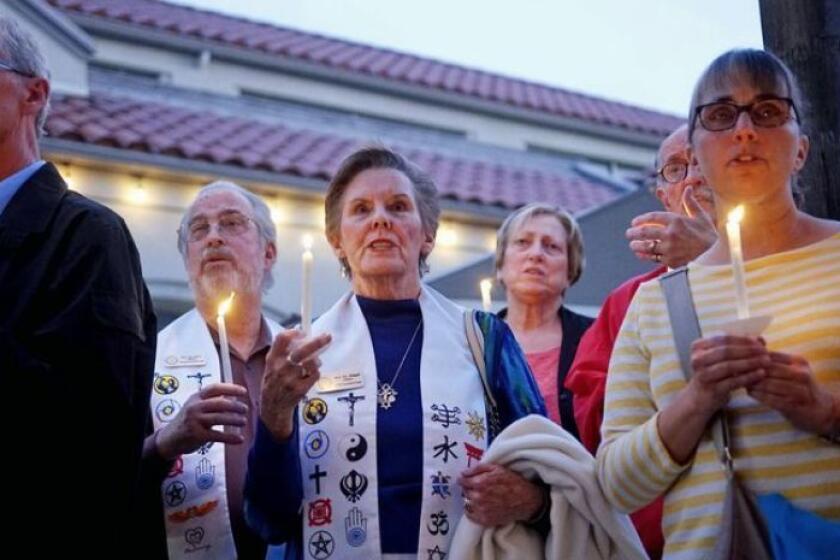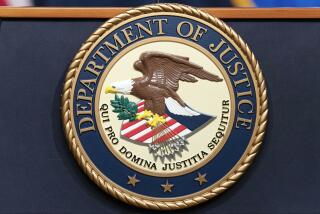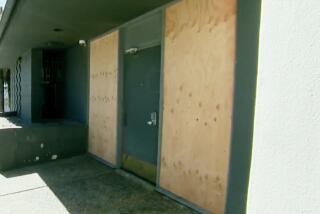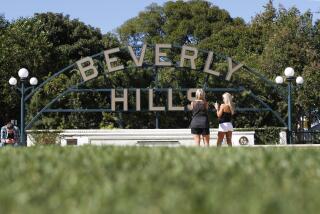Rabbi injured in Poway synagogue shooting pleads guilty to tax fraud charge
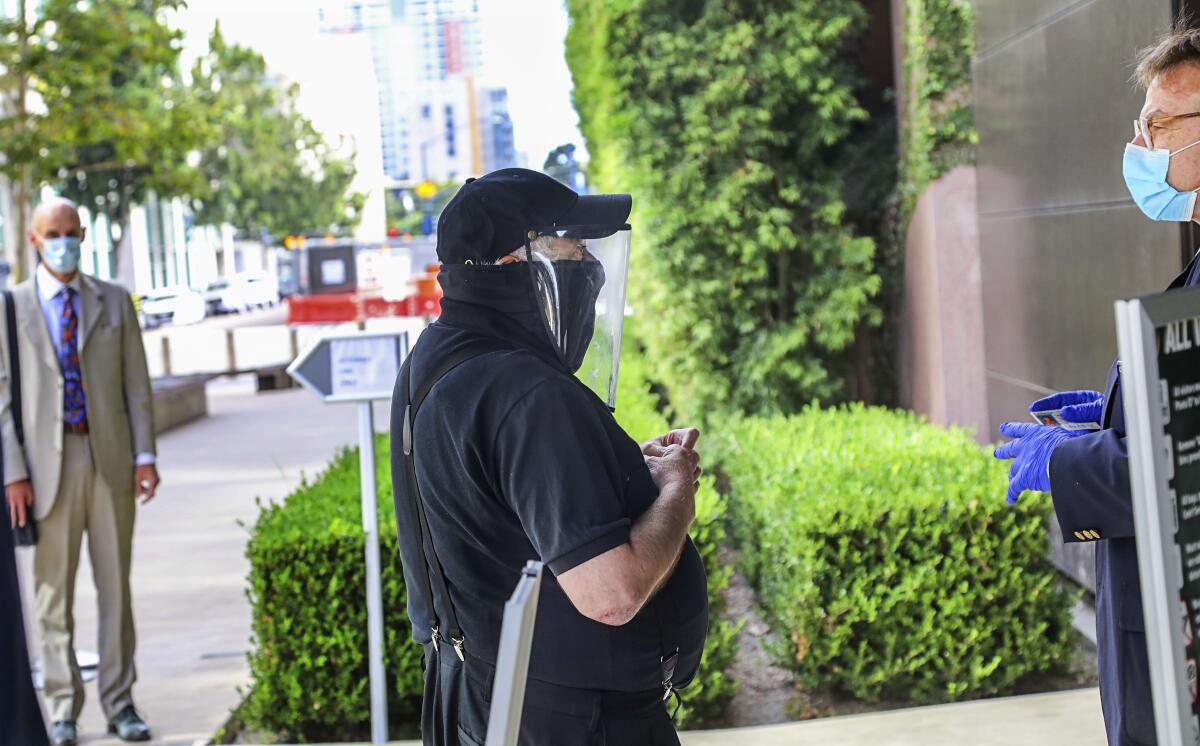
- Share via
Rabbi Yisroel Goldstein, who one year ago had part of his hand shot off in a lethal attack by a gunman at the Poway synagogue he founded and received an outpouring of support that included meeting President Trump, pleaded guilty to federal charges of tax fraud and wire fraud Tuesday.
Goldstein, 58, pleaded guilty to his role in a scheme where donors made large contributions to Chabad of Poway, but then secretly got most of the money back. Typically, Goldstein would keep a portion of the contribution — 10% — then funnel the remaining 90% back to the donor, according to a charging document unsealed in San Diego federal court Tuesday.
With help from an unnamed office administrator at the synagogue and others, Goldstein would generate charitable giving receipts on Chabad letterhead acknowledging the donors’ “generous tax deductible donation,” according to the court document.
The donor could then claim a large charitable contribution on their taxes, though he or she had only put out a fraction of the claimed amount. The conspiracy began at least as early as 2010 and netted at least $6.2 million in fraudulent donations, resulting in tax losses to the IRS of at least $1.5 million, according to prosecutors.
Neither Goldstein nor his attorneys made any comments to a reporter after the hearing in U.S. District Court. He is scheduled to be sentenced in October and faces a maximum of five years in prison but will likely get a far lesser sentence. At least five other people are expected to plead guilty Tuesday in connection with the case.
Prosecutors say the charitable tax scheme was only one part of a more widespread effort to use the synagogue and its many connected nonprofits to illicitly raise funds and hide money, according to court documents.
The investigation into Chabad of Poway began about four years ago and involved a federal agent going undercover. Authorities served a search warrant on the synagogue on Oct. 17, 2018 — almost six months before the congregation was thrust into the national spotlight when a gunman burst into a Passover service and opened fire.
In the weeks and months that followed, Goldstein was celebrated in the news and in person, meeting Trump days after the shooting in the Rose Garden at the White House at the National Day of Prayer.
He spoke at the United Nations, at gatherings in Brazil and Poland, and locally as the keynote speaker at a forum on the rise of hate at the University of San Diego. He delivered a message of hope and optimism and became a global symbol against anti-Semitism and hate.
Vice President Mike Pence and his wife also made an unscheduled stop at the synagogue when they visited in July, and was photographed in the synagogue with his wife, Karen, and the rabbi.
He had faced a rifle-wielding assassin and witnessed the death of a beloved member of his congregation.
When Trump visited San Diego in September, Goldstein was one of a handful of people who got the prestigious positions of greeting the president as he stepped off Air Force One on the tarmac.
In November, citing exhaustion, Goldstein retired from the leadership of Chabad of Poway. One of his sons now leads the congregation.
Law enforcement and courthouse sources said that among the items investigators were seeking in that October search was $1 million in currency and a collection of gold bars.
According to prosecutors, Goldstein had purchased about 246 Suisse Fortuna 1-ounce gold bars, 246 Canadian Maple Leaf 1-ounce coins and 246 American Eagle 1-ounce coins — all worth about $1 million — as a way to conceal the source of a large donation from one co-conspirator. Goldstein delivered the gold and coins to the donor, keeping $160,000, according to the court documents.
Authorities say Goldstein established several nonprofits since the Chabad’s opening in 1986, including Friendship Circle of San Diego, an active charity that supports people with special needs and their families. Prosecutors said though some of the nonprofits provided legitimate services to the community, “others were non-functioning shell entities that existed primarily on paper or simply as bank account holders,” according to the charging document. Goldstein, the government said, “used bank accounts held by these entities to conceal his illegal financial transactions and avoid detection by other Chabad officials, from the IRS, and from law enforcement.”
Some of those incidents involved donors who were employees of large corporations with matching donation programs, according to court documents. The employees would give money “disguised as charitable donations” to Goldstein, the Chabad, the Friendship Circle of San Diego or other entities and then induce their employer to give matching donations, prosecutors said.
Rabbi Yisroel Goldstein, wounded in Saturday’s deadly attack at his California synagogue, has vowed that the violence will not intimidate or deter him.
“But instead of using the donations for charitable purposes, Defendant would secretly funnel back the employees’ funds to the purported donors, allowing the employees to evade income taxes and fraudulently inducing the employers to make unwarranted corporate matching grants — which Defendant would keep,” prosecutors said.
Goldstein is also accused of using Chabad bank accounts to help others avoid income taxes, according to prosecutors. One freelance worker in particular was allowed to deposit hundreds of thousands of dollars of income in a synagogue account, with Goldstein taking 10% of the proceeds, according to the charging document.
Goldstein learned he was under investigation when the FBI and IRS served the search warrant in October 2018.
“After learning he was under investigation, Defendant took steps to warn certain of his co-conspirators of the investigation, which allowed his co-conspirators to take steps to conceal their tax evasion scheme,” prosecutors alleged.
The investigation was ongoing, but not public information, when a shooter attacked the synagogue on April 27, 2019.
One congregant, Lori Gilbert-Kaye, was killed and three others were injured in the anti-Semitic attack. Among them was Goldstein, who lost his right index finger when hit by one of the rounds fired by the gunman.
John Earnest, 20, has been charged in the attack both in state and federal court.
A statement from Chabad-Lubavitch World Headquarters in New York said news of the plea was “shocking and troubling.” It said when the organization learned he was under investigation late last year it moved to relieve him of his duties.
“Rabbi Yisroel Goldstein’s actions broke the law, breached the trust vested by the United States in its stewards of charitable organizations, and violated everything that Judaism and our movement stand for,” the statement said.
San Diego County Dist. Atty. Summer Stephan has decided to seek the death penalty against Earnest, a former student at Cal State San Marcos. A spokesman for the office said it could not comment on any aspect of the pending criminal case.
Federal prosecutors have also charged Earnest with hate crimes and obstructing free exercise of religious beliefs charges, which also make him eligible for the death penalty in federal court. The Department of Justice has not made a decision about what penalty to seek if Earnest is convicted.
Moran and Davis write for the San Diego Union-Tribune. Lyndsay Winkley contributed to this report.
More to Read
Sign up for Essential California
The most important California stories and recommendations in your inbox every morning.
You may occasionally receive promotional content from the Los Angeles Times.
